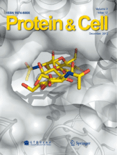
IUBMB LIFE
Scope & Guideline
Shaping Tomorrow’s Science Today
Introduction
Aims and Scopes
- Molecular and Cellular Biology:
Research articles focusing on the molecular mechanisms of cellular processes, including signal transduction, gene expression, and cellular metabolism. - Cancer Biology:
Studies on the biochemical and molecular basis of cancer, including tumorigenesis, metastasis, and therapeutic resistance. - Neurobiology and Neurodegeneration:
Investigations into the molecular pathways involved in neurodegenerative diseases, including Alzheimer's and Parkinson's disease, as well as the role of neuroinflammation. - Metabolism and Endocrinology:
Research on metabolic pathways, their regulation, and implications for diseases such as diabetes and obesity. - Biotechnology and Therapeutics:
Development and application of biotechnological approaches for therapeutic interventions, including drug development and gene therapy. - Environmental and Ecological Biochemistry:
Studies exploring the biochemical interactions within ecosystems, including the effects of pollutants and the biochemical basis of environmental stress responses. - Systems Biology and Bioinformatics:
Research utilizing computational and systems biology approaches to understand complex biological systems and interactions.
Trending and Emerging
- Cancer Immunotherapy:
A significant increase in publications related to immunotherapy approaches for cancer treatment, emphasizing the development of novel immune checkpoint inhibitors and personalized cancer vaccines. - Long Non-Coding RNAs (lncRNAs) in Cancer:
Research on the role of lncRNAs in cancer biology is rapidly gaining attention, focusing on their regulatory mechanisms and potential as therapeutic targets. - Metabolomics and Metabolic Reprogramming:
Emerging interest in metabolomics as a tool for understanding disease mechanisms and therapeutic responses, particularly in cancer and metabolic disorders. - Gene Editing Technologies:
Growing research on CRISPR/Cas9 and other gene editing technologies, highlighting their applications in gene therapy and functional genomics. - Microbiome Research and Human Health:
An increasing focus on the human microbiome's role in health and disease, particularly its implications for cancer therapy and metabolic diseases. - Nanomedicine and Targeted Drug Delivery:
Research on nanotechnology applications in medicine, particularly for targeted drug delivery systems and cancer therapeutics, is on the rise. - Precision Medicine and Personalized Therapies:
A trend towards precision medicine approaches tailored to individual patient profiles, especially in oncology and rare diseases.
Declining or Waning
- Traditional Pharmacology and Drug Development:
There has been a noticeable decrease in publications focusing on traditional pharmacological approaches, as newer methodologies like targeted therapies and personalized medicine gain traction. - Basic Plant Biochemistry:
Research dedicated to fundamental plant biochemistry has waned, possibly due to a shift towards more applied research in agricultural biotechnology and plant-microbe interactions. - Microbial Physiology:
Studies specifically addressing microbial physiology seem to be less frequent, which could indicate a broader focus on microbial ecology and its applications rather than isolated physiological studies. - Invertebrate Model Organisms in Biochemistry:
Research utilizing invertebrate models for biochemical studies appears to be declining, potentially as researchers gravitate towards mammalian models or advanced in vitro systems.
Similar Journals

BIOCHEMISTRY-MOSCOW
Illuminating the Path of Biochemical ProgressBIOCHEMISTRY-MOSCOW is a distinguished academic journal published by MAIK NAUKA/INTERPERIODICA/SPRINGER, focusing on pivotal research in the fields of biochemistry, biophysics, geriatrics, and broader medical sciences. Established in 1972, the journal has a rich history of disseminating critical findings and innovative studies, making significant contributions to the advancement of biochemical knowledge and applications. With its Q2 ranking in various categories including biochemistry and gerontology, the journal commands respect within the scientific community, offering a reputable platform for both established researchers and emerging scholars alike. Although traditionally not an open-access journal, it provides a wealth of information accessible through institutional subscriptions, ensuring the latest advancements reach a global audience. The journal aims to enhance understanding of biochemical processes and their implications for human health, and its commitment to high-quality peer-reviewed content has established it as a vital resource for those invested in the life sciences.

JOURNAL OF BIOSCIENCES
Fostering Excellence in Cutting-edge Biosciences ResearchJOURNAL OF BIOSCIENCES, published by the Indian Academy of Sciences, has established itself as a pioneering platform in the fields of biosciences, encompassing diverse research areas such as agricultural and biological sciences, biochemistry, genetics, molecular biology, and medicine. With an impressive trajectory since its inception in 1979, the journal has achieved notable recognition, securing a Q1 ranking in Agricultural and Biological Sciences and maintaining its place in the top quartiles for Biochemistry and Medicine as of 2023. With Scopus rankings placing it at #32 in General Agricultural and Biological Sciences and #65 in General Biochemistry, Genetics, and Molecular Biology, the journal reaches the 85th and 70th percentiles respectively, reflecting its impact and relevance in current scientific discourse. Although it does not offer open access, the JOURNAL OF BIOSCIENCES remains crucial for researchers, professionals, and students dedicated to advancing knowledge and innovation within the biosciences, providing a vibrant forum for high-quality research and comprehensive reviews.

Protein & Cell
Shaping the Future of Scientific Collaboration and DiscussionProtein & Cell, published by Oxford University Press, is a distinguished international journal focusing on cutting-edge research in the fields of biochemistry, biotechnology, cell biology, and drug discovery. This open access journal, active since 2014, is dedicated to disseminating innovative findings that advance our understanding of protein functions and cellular processes, making it an essential resource for researchers, professionals, and students alike. With an impressive 2023 impact factor reflected in its Q1 ranking across multiple categories such as Biochemistry, Drug Discovery, and Cell Biology, 'Protein & Cell' stands at the forefront of scientific research, driving collaboration and discussion in the scientific community. Researchers can access the journal freely online, fostering a global exchange of knowledge and contributing to significant advancements in medicine and biotechnology. Located in the United Kingdom, the journal strives to be a pivotal platform for impactful research that influences future studies and applications.

Cold Spring Harbor Perspectives in Biology
Connecting Research with Revolutionary Biological DiscoveriesCold Spring Harbor Perspectives in Biology is a prestigious academic journal published by COLD SPRING HARBOR LAB PRESS that serves as a vital resource in the fields of Biochemistry, Genetics, and Molecular Biology. With an impressive impact factor and categorized in the Q1 quartile for its contributions, this journal is renowned for curating comprehensive reviews that synthesize the latest advancements and ongoing research in these dynamic and interconnected disciplines. Since its inception in 2009, the journal has played a pivotal role in advancing scientific knowledge through high-quality articles that cater to researchers, professionals, and students alike. Although it operates on a traditional subscription model, its contributions are indispensable for those seeking to remain at the forefront of biological research and its myriad applications. With a commendable ranking of #19 out of 221 in general biochemistry, genetics, and molecular biology on Scopus, this journal ensures that its readers have access to cutting-edge insights and a rigorous academic discourse.

Biomolecules
Transforming biochemical understanding through collaborative research.Biomolecules is a prestigious, peer-reviewed journal published by MDPI that has been dedicated to advancing the field of biochemical research since its launch in 2011. With an impressive impact factor positioning it in Q1 for Biochemistry and Q2 for Molecular Biology as of 2023, this journal serves as a vital platform for disseminating high-quality research findings related to biological macromolecules, including proteins, nucleic acids, and carbohydrates. Operating as an Open Access journal, it ensures that vital research is accessible to all, furthering knowledge dissemination and collaboration within the scientific community. Located in Basel, Switzerland, the journal has established a significant presence in major academic databases, holding commendable Scopus rankings in both Biochemistry and Molecular Biology. Researchers, professionals, and students will find Biomolecules an invaluable resource for cutting-edge research, reviews, and insights in the rapidly evolving domains of biochemistry and molecular biology.

BIOSCIENCE REPORTS
Driving Progress in Biochemical and Cellular ResearchBIOSCIENCE REPORTS, published by Portland Press Ltd, is a prestigious journal dedicated to advancing the fields of biochemistry, biophysics, cell biology, and molecular biology. Founded in 1981, the journal has established itself as a vital resource for researchers and professionals, boasting a significant impact factor and high rankings within its categories, including Q2 in Biochemistry and Q1 in Biophysics as of 2023. The journal’s commitment to high-quality, peer-reviewed research ensures that it remains an influential platform for the dissemination of cutting-edge scientific findings. While it operates under a traditional subscription model, it offers various access options to accommodate the needs of the scientific community. With ongoing publication through 2024, BIOSCIENCE REPORTS continues to play a crucial role in shaping discussions in the life sciences and fostering innovative research in biology.

BIOCHEMICAL AND BIOPHYSICAL RESEARCH COMMUNICATIONS
Where critical insights meet scientific excellence.BIOCHEMICAL AND BIOPHYSICAL RESEARCH COMMUNICATIONS, published by Academic Press Inc Elsevier Science, stands as a leading periodical in the fields of biochemistry, biophysics, cell biology, and molecular biology. With an ISSN of 0006-291X and an E-ISSN of 1090-2104, this esteemed journal has been a pivotal platform for the dissemination of groundbreaking research since its inception in 1959, continuing to publish influential findings through at least 2024. It holds a commendable Q2 ranking in Biochemistry and Q1 status in Biophysics as of 2023, reflecting its high impact and relevance in the field, supported by its strong Scopus rankings—ranking #43 in Biophysics and maintaining a presence in the top quartiles of several related categories. Although it is not an open-access journal, it provides critical insights and essential data that cater to researchers, professionals, and students keen on advancing their understanding of complex biochemical and biophysical processes. Its significant contributions to the scientific community underscore the importance of this journal as a reference point for innovative research and collaborative discourse.

Journal of Biochemistry
Advancing biochemical knowledge since 1922.Journal of Biochemistry, published by Oxford University Press, is a prestigious academic journal that has been at the forefront of biochemical research since its inception in 1922. With an ISSN of 0021-924X and an E-ISSN of 1756-2651, this journal serves as a platform for disseminating high-quality research in the fields of biochemistry, molecular biology, and medicine, holding impressive rankings such as Q2 in Biochemistry and Medicine (miscellaneous) in 2023. As of 2024, the journal continues to explore significant topics in these areas, offering valuable insights for researchers, professionals, and students alike. The journal does not currently offer open access, but it remains a vital resource for anyone in the biochemical community seeking to stay updated on the latest discoveries and advancements. With its rich history and dedication to scientific excellence, the Journal of Biochemistry is an indispensable part of the scholarly landscape.

FEBS LETTERS
Pioneering New Ideas in Biochemistry and GeneticsFEBS LETTERS, published by Wiley, is a prestigious journal that has firmly established its place in the fields of biochemistry, biophysics, genetics, molecular biology, cell biology, and structural biology. With an esteemed history dating back to 1968, this journal continues to be a vital resource for researchers and professionals involved in the biological sciences. It boasts impressive quartile rankings, including Q1 statuses in several categories such as Biochemistry and Genetics, reflecting its high impact factor and significant contribution to scientific discourse. FEBS LETTERS provides a platform for innovative findings and critical reviews, fostering the exchange of knowledge and ideas within the scientific community. Although it operates under a subscription model, the journal ensures broad dissemination of groundbreaking research through its rigorous peer-review process. The vibrant discussions encouraged by articles published in FEBS LETTERS aim to inspire current and future generations of scientists to push the boundaries of biological understanding, making it an indispensable resource for anyone dedicated to advancing their knowledge in these dynamic fields.

FOLIA BIOLOGICA
Cultivating Knowledge Across Biological DisciplinesFOLIA BIOLOGICA, published by Charles University Prague, First Faculty of Medicine, is an esteemed academic journal that has been contributing to the fields of Biochemistry, Cell Biology, Developmental Biology, Genetics, Immunology, and Molecular Biology since its inception in 1961. With an ISSN of 0015-5500, this journal serves as a vital platform for researchers and professionals to disseminate their findings and advance knowledge within these disciplines. Despite its current Category Quartiles ranking in the lower tiers (Q3 and Q4), FOLIA BIOLOGICA continues to provide valued insights and foster scholarly dialogue, particularly in its paralleled fields. The journal is headquartered in Prague, Czech Republic, and operates without Open Access options, which emphasizes its focus on curated, peer-reviewed content essential for academicians and students. By bridging theoretical and practical knowledge, FOLIA BIOLOGICA remains committed to enriching the scientific community and serving as a cornerstone for future research innovations.